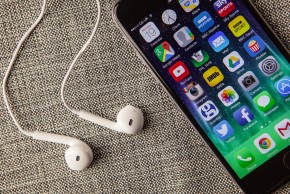Mom vs. Daughter: A Smartphone Debate

My daughter, age 12, had been ruminating over it a lot more lately since 6th grade started. Her grumblings had begun years ago but were snowballing as this school year rolled on. She wanted a smartphone. "I need one. Everyone has one," she would say.
Then she surprised me one afternoon recently when she presented to me what sounded like the closing arguments of a long, emotional trial in the kitchen where all important family matters happen these days. Here are my daughter and I, face to face, and she is fighting respectfully and with dignity to win me, the jury, over to her side of the argument. She came to me prepared with a hand written list of all the reasons why she should be allowed to have a phone.
Her reasons were good- great, actually- as she tried to convince me through what she thought were a parent's perspective of why a phone would be useful. Some of her reasons included: "Staying in touch with friends over the summer" and "You (Mom) can call or text me when you are running 10 minutes late to pick me up." But I was not convinced. My gut had been telling me that she'd be better off having to wait the extra 10 minutes, sans phone, and be left to employ her natural coping mechanisms as she sorts out her boredom, frustration and anxiety until I finally show up. But why? Why did I feel this way? Initially I was going on instinct, but two years ago I started a journey to find the answers to my burning question: What are the social, emotional and behavioral effects of tech on the developing kid's brain?
My quest led me to this conclusion: smartphones are not good for kids. Were it not for my quest for knowledge, the sheer fact that I'm tired of seeing kids everywhere looking down all the time, missing out on the world as it spins by might have been enough to convince me that this would not be a toy I would be providing for my children, but I needed something more. I needed to know what all the texting, sexting, posting and surfing was doing to their brains. Were they becoming addicted? What was happening?
A lot. In fact more than I can cover in this post, but as tech takes center stage in kids' lives, here's a sampling of behavior that kids used to learn naturally as they grew up, but is now getting lost: learning how to wait, what to do when bored, how to employ the imagination, how to play, how to look adults in the eye when speaking, how to read body language and social cues, learning to focus and concentrate, learning the art of conversation, learning to empathize.
Research backs me up. Medical studies show that the brain is the last organ of the body to become anatomically mature. It keeps growing until about age 25. Specifically the frontal cortex, located toward the front of the brain, is one of the last areas of the brain to become fully developed. As smartphones cause multiple distractions for kids, it is getting harder for them to pay attention. The ability to focus comes from practice, and kids are not getting enough of that. To make matters worse, the neural circuitry formed from focusing and paying attention is "identical for the circuits for managing distressing emotion, "says Dr. Daniel Goleman, a psychologist and author of Focus: The Hidden Driver of Excellence. He goes on to say that "this is the area of the brain that allows people to control themselves, to keep emotions in check and to feel empathy for other people." Healthy maturation of this area allows adults to think through long term results, plan for the future, and make decisions today based on the possibilities of future consequences.
At the tender age of 12, my child has a lot of neural circuitry that need to be formed, and I don't need to introduce into her life the distraction of a smartphone to complicate that healthy development. After all, aren't we as parents constantly trying to keep our kids healthy by excluding or limiting fast food, fried food, candy and the like? I suggest we start concentrating on keeping their brain development healthy too by excluding or limiting the amount of technology they take in. And with a smartphone in their sweaty, curious hands, it's going to be hard for a parent to control.
When my daughter finished her closing arguments, I asked her one simple question: with school, sports, outdoor play and hobbies, what would she give up in order to make time for doing all the things she wanted to do on her phone if I were to give her one? Her answer: reading. With that, the jury has reached a verdict, and I'm at peace with the decision. She is currently laser focused on a new book she found at the library, and her brain has found a way to cope with the situation, thanks to that healthy, developing brain.









